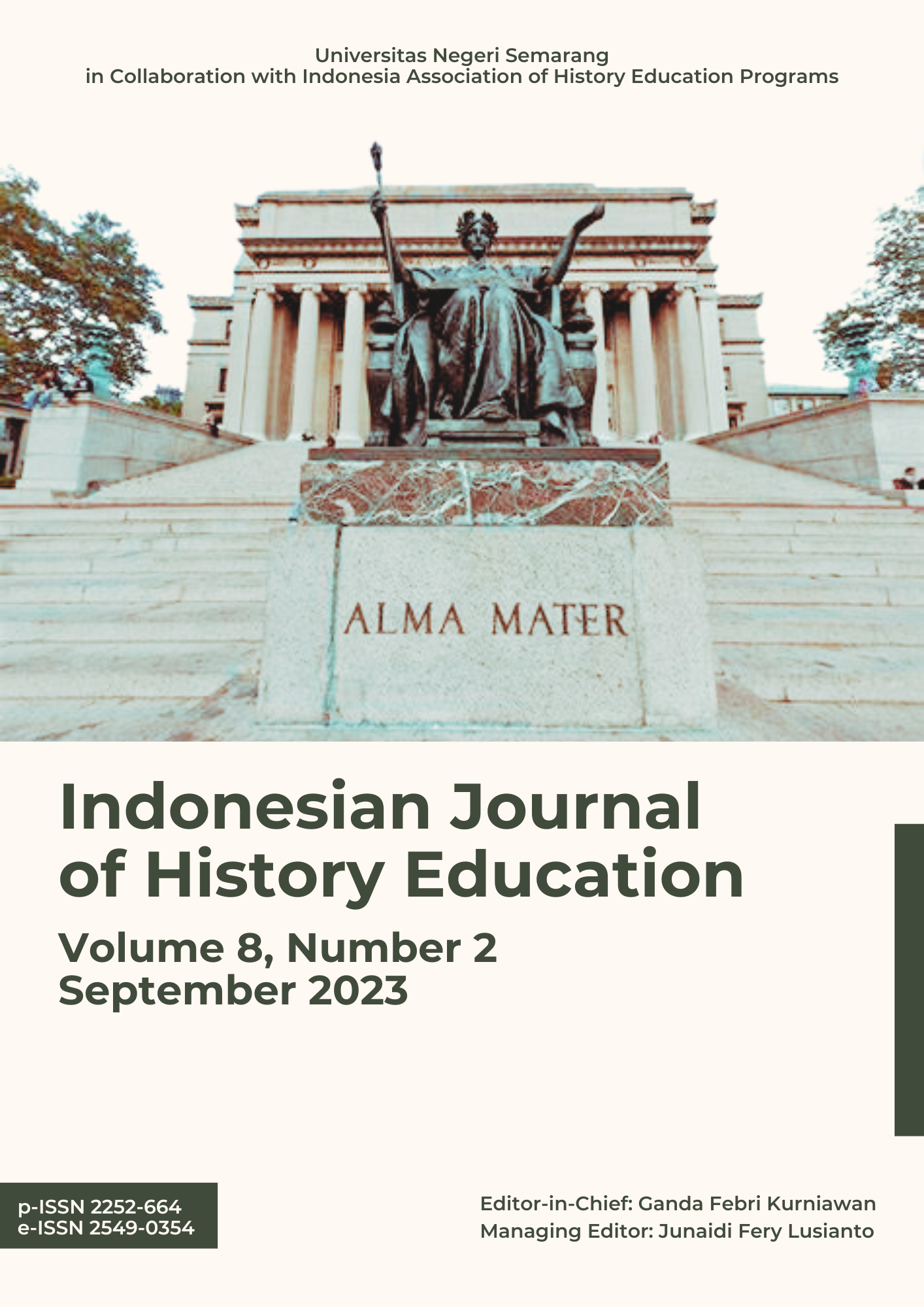Competence of History Teachers in Managing IT-Based Interactive Learning at Zaria Nigeria
Abstract
The aim of this research is to determine teachers' abilities in using IT-based interactive learning media in high school history learning in Zaria, analyze the obstacles teachers encounter in utilizing IT-based interactive learning media in history learning in Zaria, and determine the positive and negative impacts of using interactive learning media. IT-based history learning. The research subjects were history teachers and 22 students. This type of research is descriptive research with a qualitative approach. The results of this research illustrate that the ability of history teachers to use IT-based interactive learning media is quite good using the Management System for Teaching and Learning (MSTL). Teachers are skilled in utilizing information technology facilities and developing material into IT-based media products that are interesting and easy to apply in history learning. One of the positive impacts of using IT-based interactive learning media is that it makes it easier for teachers to deliver very dense history learning material. Meanwhile, one of the negative impacts is that it causes teachers to become dependent on information technology-based learning media.
References
Abubakar, A. (2013). Role of social studies education in national development in Nigeria. Academic journal of interdisciplinary studies, 2(6), 23.
Adepoju, O. O., & Nwulu, N. I. (2020). Engineering Students' Innovation Competence: A Comparative Analysis of Nigeria and South Africa. Int. J. Eng. Pedagog., 10(6), 147-155.
Agbele, A. T., & Oyelade, E. A. (2020). Impact of COVID-19 on the Nigerian educational system: Strengths and challenges of online/virtual education. Asian Journal of Education and Social Studies, 13(1), 26-35.
Akpomi, M. E., Dambo, B. I., Ikpesu, O. C., Singer, S. A., Wokocha, K. D., Ben-George, I., & Babalola, J. O. (2020). Educational, scientific and technological innovations for sustainable development in Nigeria. World Journal of Entrepreneurial Development Studies, 5(1), 50-63.
Asikhia, O. A. (2010). Students and teachers’ perception of the causes of poor academic performance in Ogun State secondary schools [Nigeria]: Implications for counseling for national development. European Journal of Social Sciences, 13(2), 229-242.
Atubi, F. O. (2020). Combating Security Challenges in Nigeria through Social Studies Education. Ibadan Journal of Educational Studies, 17(1), 28-34.
Azor, R. O., Asogwa, U. D., Ogwu, E. N., & Apeh, A. A. (2020). YouTube audio-visual documentaries: Effect on Nigeria students’ achievement and interest in history curriculum. The Journal of Educational Research, 113(5), 317-326.
Byrd, R. (2020). Qualitative research methods. Virtual Class, Memphis. Recuperado em, 17.
Calabar, C. N. (2014). Socio-cultural factors affecting the teaching and learning of Social Studies in Nigeria. Journal of Education and practice, 5(24), 153-158.
Dania, P. (2015). Civic Education as a Collaborative Dimension of Social Studies Education in Attainment of Political Ethics in Nigeria. Journal of Education and Practice, 6(28), 48-52.
Dania, P. O., & Emuebie, J. E. (2012). Social studies education in the 21st century, a tool for fighting corruption in Nigeria. African Research Review, 6(2), 181-191.
Dosunmu, A. G. (2020). Women and Status of Lifelong Learning in Nigeria. The Education Systems of Africa, 1-22.
Edinyang, S. D., Effiom, V. N., Effiom, J. E., & Doris, U. (2020). Assessment of implementation of social studies curriculum for effective citizenship in upper basic education of cross river state of Nigeria. European Journal of Social Sciences, 59(1), 63-77.
Ekpo, K., Akpan, O. E., Essien, E. E., & Imo-Obot, M. M. (2009). Classroom climate and students’ academic achievement in social studies in cross river, nigeria. African Research Review, 3(4).
Ibidunni, A. S., Kolawole, A. I., Olokundun, M. A., & Ogbari, M. E. (2020). Knowledge transfer and innovation performance of small and medium enterprises (SMEs): An informal economy analysis. Heliyon, 6(8).
Ifegbesan, A. P., Lawal, M. B., & Rampedi, I. T. (2017). The Nigeria Teachers Social Studies Training Curriculum and Sustainable Development Goals: A Content Analysis. Journal of International Social Studies, 7(1), 92-122.
Obro, S. (2021). The Internet and Quality Social Studies Education for Sustainable Development in Post-Covid-19: a Review. Jurnal Penelitian dan Pengkajian Ilmu Pendidikan: e-Saintika, 5(1), 15-26.
Okobia, E. O. (2011). Availability and teachers' use of instructional materials and resources in the implementation of social studies in junior secondary schools in Edo State, Nigeria. Rev. Eur. Stud., 3, 90.
Olayinka, O. T. (2020). Social studies students’ knowledge, attitude and practice of concepts of sustainable development in Ondo City, Nigeria. International Journal of Financial, Accounting, and Management, 1(4), 221-233.
Oyediran, W. O., Omoare, A. M., Owoyemi, M. A., Adejobi, A. O., & Fasasi, R. B. (2020). Prospects and limitations of e-learning application in private tertiary institutions amidst COVID-19 lockdown in Nigeria. Heliyon, 6(11).
Radwan, I., & Pellegrini, G. (2010). Knowledge, productivity, and innovation in Nigeria: creating a new economy. World Bank Publications.
Widayati, U., & Witasari, N. (2023). Pemanfaatan Learning Management System (LMS) Berbasis Moodle dalam Pembelajaran Sejarah Pada Kelas X SMK Negeri 3 Magelang. Indonesian Journal of History Education, 8(1), 121-130.
Copyright (c) 2023 IJHE

This work is licensed under a Creative Commons Attribution 4.0 International License.
Copyright Notice
An author who publishes in the Jurnal Indonesian Journal of History Education agrees to the following terms:
- Author retains the copyright and grants the journal the right of first publication of the work simultaneously licensed under the Creative Commons Attribution-ShareAlike 4.0 License that allows others to share the work with an acknowledgement of the work's authorship and initial publication in this journal
- Author is able to enter into separate, additional contractual arrangements for the non-exclusive distribution of the journal's published version of the work (e.g., post it to an institutional repository or publish it in a book) with the acknowledgement of its initial publication in this journal.
- Author is permitted and encouraged to post his/her work online (e.g., in institutional repositories or on their website) prior to and during the submission process, as it can lead to productive exchanges, as well as earlier and greater citation of the published work (See The Effect of Open Access).
Read more about the Creative Commons Attribution-ShareAlike 4.0 Licence here: https://creativecommons.org/licenses/by-sa/4.0/.




